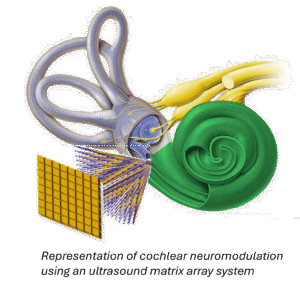
Research Internship – Simulation of ultrasound propagation in the human cochlea for neuromodulation of ganglionar cells in hearing restoration
 Objective of the project: determine via ultrasound propagation simulations if neuromodulation of neurons in the cochlea is doable.
Objective of the project: determine via ultrasound propagation simulations if neuromodulation of neurons in the cochlea is doable.
Context: Hearing restoration using cochlear implant is very widely used (more than 1 million people implanted worldwide) but non-optimal due to unbridgeable constraints:
- limitation in spatial resolution of electrical stimulation via an electrode array due to conduction of tissue. → limitation in spectral resolution
- limitation of the implantation depth of the electrode array within the cochlea due to the surgical procedure → limitation in spectral range and spectral mismatch.
Therefore alternative strategies would be beneficial. The natural (or enhanced) response of neurons to ultrasound could be used to envision an ultrasound based cochlear implant.
Goal and methods: the goal of this internship is to decipher to which extent and with which input parameters ultrasound focusing can be performed in the cochlea to be suitable for ultrasound neuromodulation, and to characterize the quality of the focusing, via extensive ultrasound propagation simulations. These simulations will combine the k-wave acoustic toolbox for simulation of ultrasound propagation within the cochlea and optimization algorithms to tune the spatial and temporal available degrees of freedom to the target focusing requirements. In vitro validations using realistic phantoms (3D printed) will be then performed if duration allows.
Candidate Profile: We are looking for a M2 student who is interested in the interface between physics and medicine, proficient with acoustics and coding, preferably with some experience in benchtop experiment.
Dates: between Februrary and July 2026
Supervisor:
Name: Charlie Demené
Contact: Charlie Demené (charlie.demene@espci.fr)





